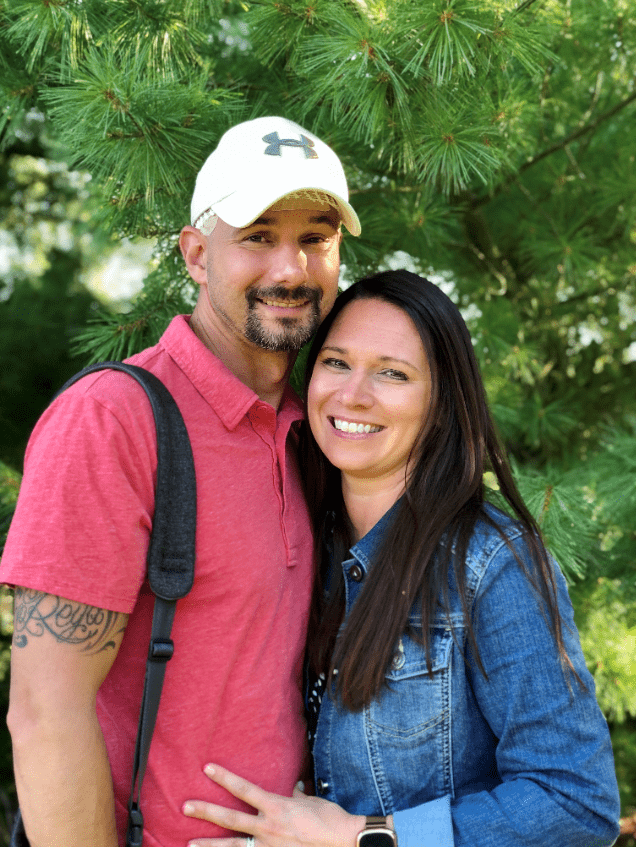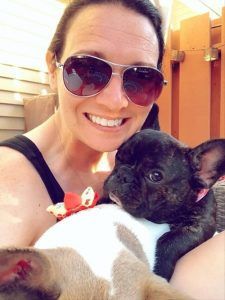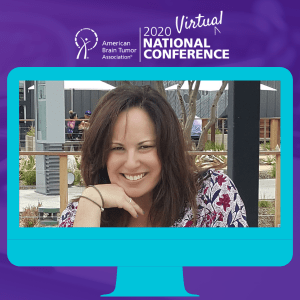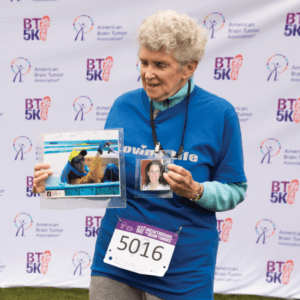Sponsored Content:
This content is not an endorsement from the ABTA.
Sponsored by Novocure®
By: Amanda, Optune Caregiver

By: Amanda, Optune Caregiver
Newlyweds with a New Diagnosis
When you think of being a newlywed, what comes to mind? Laughter, love, spending forever with your partner—these are just a few things I thought of.
Cancer never crossed my mind.
Four months into marriage, “forever” suddenly shifted to, “Do we have tomorrow?”
Stuck on Autopilot
Every single day, I faced daunting statistics, decisions about treatments, and the overwhelming feeling that I was drowning.
I remember being on autopilot and not even realizing I was on autopilot. Get up, get the kids ready for school, follow up on medications, go to work, drive to appointments, pick the kids up, make dinner—the list goes on and on.
The minute I would leave the house alone, I found myself sobbing. It was the only time I didn’t have to shove my feelings down and make sure that everyone else was okay.
It was the only time I could stop acting like I was okay.
Acknowledging Grief
I started to feel like no one cared about my well-being, though I know that wasn’t the case. I felt myself fading away.
This is the point I became aware that I wasn’t giving myself what I needed to be a good wife and mother—to be present in our lives.
“I realized that while I had been on autopilot, I had been ignoring my anger and my grief for the life I had been dreaming of. I had to acknowledge these feelings and tell myself they were valid. Then I had to ask, ‘What can I control? What can I do?’”
Amanda, Optune Caregiver
Remind yourself how good you feel after a full night’s sleep. It sometimes gives you a new perspective or hope—the ability to do what felt impossible yesterday.

Putting Yourself First
With this new awareness into my grief and my mental health, I took the first step and scheduled a massage. That 90 minutes of time for me and about me was the reminder that I needed to make myself a priority, as well as my husband and family.
Today, I spend more time walking, gardening, sewing, and getting massages, and it allows me to be a better wife and caregiver. My husband didn’t ask to have glioblastoma, but he also didn’t ask to lose the spark for life that he has with his wife.
I owe him the very best version of myself.

You Matter
Being a mother, a wife, and holding a career is enough to require you to take time for yourself. Add in being a caregiver and that need grows exponentially.
If I could share some advice, please allow people to help you. Preparing meals, grocery shopping, sitting with your loved one while you take a nap—it doesn’t matter what it might be, people want to help. They don’t have to understand what you are feeling.
It is okay to ask for help. You matter, and you are grieving. You need to be able to breathe so you can be the best version of you.
What is Optune® approved to treat?
Optune is a wearable, portable, FDA-approved device indicated to treat a type of brain cancer called glioblastoma multiforme (GBM) in adult patients 22 years of age or older.
Newly diagnosed GBM
If you have newly diagnosed GBM, Optune is used together with a chemotherapy called temozolomide (TMZ) if:
- Your cancer is confirmed by your healthcare professional AND
- You have had surgery to remove as much of the tumor as possible
Recurrent GBM
If your tumor has come back, Optune can be used alone as an alternative to standard medical therapy if:
- You have tried surgery and radiation and they did not work or are no longer working AND
- You have tried chemotherapy and your GBM has been confirmed by your healthcare professional
Who should not use Optune?
Optune is not for everyone. Talk to your doctor if you have:
- An implanted medical device (programmable shunt), skull defect (missing bone with no replacement), or bullet fragment. Optune has not been tested in people with implanted electronic devices, which may cause the devices not to work properly, and Optune has not been tested in people with skull defects or bullet fragments, which may cause Optune not to work properly
- A known sensitivity to conductive hydrogels (the gel on the arrays placed on the scalp like the ones used on EKGs). When Optune comes into contact with the skin, it may cause more redness and itching or may rarely cause a life-threatening allergic reaction
Do not use Optune if you are pregnant or are planning to become pregnant. It is not known if Optune is safe or effective during pregnancy.
What should I know before using Optune?
Optune should only be used after receiving training from qualified personnel, such as your doctor, a nurse, or other medical staff who have completed a training course given by Novocure®, the maker of Optune.
- Do not use any parts that did not come with the Optune Treatment Kit sent to you by Novocure or given to you by your doctor
- Do not get the device or transducer arrays wet
- If you have an underlying serious skin condition on the scalp, discuss with your doctor whether this may prevent or temporarily interfere with Optune treatment
What are the possible side effects of Optune
Most common side effects of Optune when used together with chemotherapy (temozolomide, or TMZ) were low blood platelet count, nausea, constipation, vomiting, tiredness, scalp irritation from the device, headache, seizure, and depression. The most common side effects when using Optune alone were scalp irritation (redness and itchiness) and headache. Other side effects were malaise, muscle twitching, fall and skin ulcers. Talk to your doctor if you have any of these side effects or questions.
Please visit Optune.com/Safety for the Optune Instructions For Use (IFU) for complete information regarding the device’s indications, contraindications, warnings, and precaution.
©2021 Novocure GmbH. All rights reserved. Optune, Novocure and nCompass are trademarks of Novocure. US-OPT-04361 March 2021



















